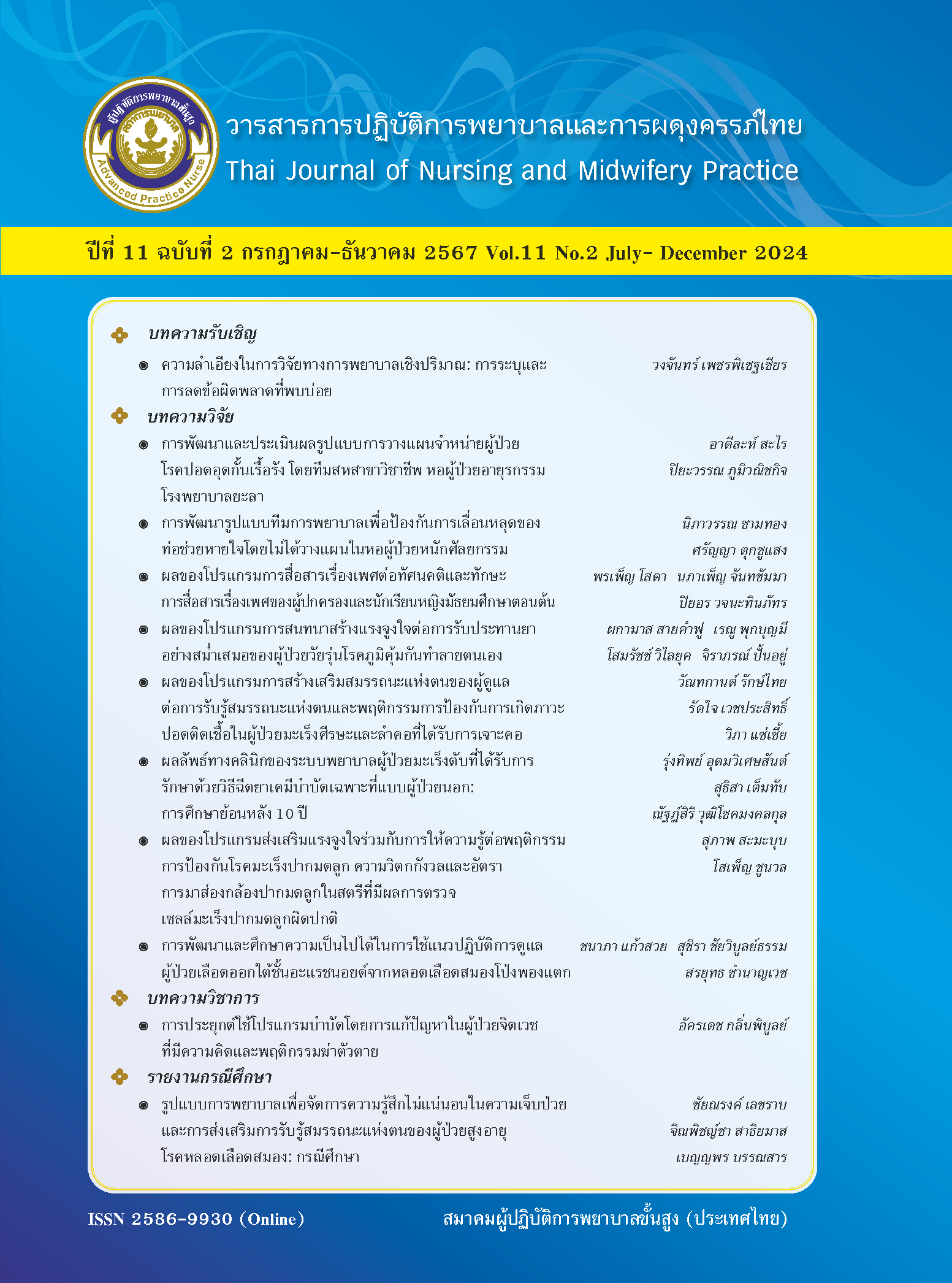Applying the Problem-Solving Therapy Program for psychiatric patients with suicidal ideations and behaviors
Main Article Content
Abstract
Abstract: Thailand is the 3rd highest in the global ranking of suicide rates. Furthermore, 45% of psychiatric patients were found to be at high risk of suicide. Risk factors were found to include having a negative view of the problem, inappropriate problem-solving skills, impulsive feelings, low self-worth, denial and avoidance of problems, stress and depression. Suicide is not a terrible disease and can be prevented by having a good protective and monitoring system. Patients, family and significant people must clearly perceive and understand the problems and their causes, and this will enable to provide immediate assistance. This article aims to describe the concept and therapeutic scheme innovated from research and development of problem-solving therapy program for psychiatric patients with suicidal ideations and behaviors (PST-PPS) under the 5-factor model. A case study is applied in which patients are engaged in every step of therapy, helping them to learn and solve problems effectively through the process of identifying the problems and having a positive view of them, and also increasing the problem-solving skill with creative options and logical thinking skills on a daily basis. Supporting patients to increase their problem-solving skills step-by-step until they can direct themselves, initiating a good plan, and finding ways to solve their problems effectively would help patients to gain more problem-solving skills, and this can reduce suicidal thoughts and behaviors.
Downloads
Article Details

This work is licensed under a Creative Commons Attribution-NonCommercial-NoDerivatives 4.0 International License.
References
Word Health Organization, Mental health: Suicide data [Internet]. 2018 [cited 27 Aug 2024]. Geneva: WHO; 2018. Available from: http://www.who.int/mental health/prevention/ suicide/suicideprevent/en
Carballo JJ, García-Nieto R, Harkavy-Friedman J, et al. Aggressiveness across development and suicidal behavior in depressed patients. Archives of Suicide Research. 2014; 18(1): 39-49.
Park S, Lee Y, Youn T, et al. Association between level of suicide risk, characteristics of suicide attempts, and mental disorders among suicide attempters. BMC Public Health. 2018; 18: 477
Zalsman G, Hawton K, Wasserman D, et al. Suicide prevention strategies revisited: 10-year systematic review. Lancet Psychiatry. 2016; 3: 646-59.
Riblet NB, Shiner B, Young-Xu Y, et al. Strategies to prevent death by suicide: Meta-analysis of randomised controlled trials. The British Journal of Psychiatry. 2017; 210(6): 396-402.
D’Zurilla TJ, Nezu AM. Problem-solving therapy. In Dobson KS (Ed.), Handbook of cognitivebehavioral therapies. 3rd ed. Guilford Press. 2010; p.197-225.
Klinpiboon A, Yodklang O, Kanachai V, et al. The development of problem-solving therapy programs for psychiatric patients with suicide ideations and behaviors who received the services at Khon Kaen Rajanagarindra Psychiatric Hospital (PST-PPS). J Ment Health Thai. 2020; 28(1): 86-98. Thai.
Khon Kaen Psychiatric Hospital. Annual Report of Khon Kaen Psychiatric Hospital. Khon Kaen: Department of Mental Health; 2018
Department of Mental Health. Annual Report Department of Mental Health, Fiscal Year 2018. Department of Mental Health. Available from: https://dmh-elibrary.org/items/show/188.pdf.
Tapinta D, Sakulphan S, Inthong S. Effectiveness of problem-solving therapy for depression in Thai depressed patients: A randomized controlled study. Chiang Mai: Faculty of Nursing; 2014. Thai.
Vlachou A, Stavroussi P, Didaskalou E. Problemsolving training: An intervention program for enhancing international problem-solving skill in children with intellectual disabilities. Hellenic Journal of Psychology. 2017; 14: 114-38.
Beaudreau SA, Gould CE, Sakai E, et al. Problem-Solving Therapy. In: Pachana N, editors. Encyclopedia of Geropsychology. Singapore: Springer; 2017; 1874-83.
Kiosses DN, Alexopoulos GS. Problem solving therapy in the elderly. Curr Treat Options Psychiatry. 2014; 1(1): 15-26. doi: 10.1007/s40501013-0003-0.
Zhang A, Park S, Sullivan JE, et al. The effectiveness of problem-solving therapy for primary care patients’ depressive and/or anxiety disorders: A systematic review and meta-analysis. J Am Board Fam Med. 2018; 31(1): 139-50. doi: 10.3122/jabfm.2018.01.170270.
Simon SS, Cordás TA, Bottino CM. Cognitive behavioral therapies in older adults with depression and cognitive deficits: A systematic review. Int J Geriatr Psychiatry. 2015; 30(3): 223-33. doi: 10.1002/gps. 4239.
Liu Z, Yang F, Lou Y, et al. The effectiveness of reminiscence therapy on alleviating depressive symptoms in older adults: A systematic review. Front Psychol. 2021; 12: 709853. doi: 10.338 9/fpsyg.2021.709853.
Brown GK, Jager-Hyman S. Evidence-based psychotherapies for suicide prevention: Future directions. American Journal of Preventive Medicine. 2014; 47(3): S186-S194.
National Registry of Evidence Based Practices and Programs (NREPP). Substance abuse mental health services administration. Problem solving therapy: Program description [Internet]. 2018 [cite May 19]. Available from: https://nrepp.samhsa.gov/ProgramProfile.aspx?id=108.
Gustavson KA, Alexopoulos GS, Niu GC, et al. Problem-solving therapy reduces suicidal ideation in depressed older adults with executive dysfunction. The American Journal of Geriatric Psychiatry. 2016; 24(1): 11-7.
Choi NG, Marti CN, Conwell Y. Effect of problem solving therapy on depressed low income homebound older adults’ death/suicidal ideation and hopelessness. Suicide and Life Threatening Behavior. 2016; 46(3): 323-36.
Goetz DB. An Evaluation of different measures of social problem-solving: Using ecological momentary assessment [dissertation]. Michigan: Western Michigan University; 2020. 86 p.
Kourmousi N, Xythali V, Theologitou M, et al. Validity and reliability of the problem solving inventory (PSI) in a Nationwide Sample of Greek Educators. Soc. Sci.2016; 5(2): 25. doi:10.3390/socscI 020025.
Ngamtipwattana T, Phasaitutawat S, Chalermchainukul M. Stress and problem-solving patterns of medical students 3rd year, Faculty of Medicine, Siriraj Hospital. J Psychiatr Assoc Thailand. 2000; 45(1): 59-69. Thai.
Hawton K, Witt KG, Salisbury TL, et al. Psychosocial interventions following self-harm in adults: A systematic review and meta-analysis. Lancet Psychiatry. 2016; 3(8): 740-50. doi: 10.1016/S2215-0366(16)30070-0.
Sheehan DV, Lecrubier Y, Harnett-Sheehan K, et al. Reliability and validity of the MINI International neuropsychiatric interview (M.I.N.I.): According to the SCID-P. European Psychiatry. 1997; 12: 232-41.


